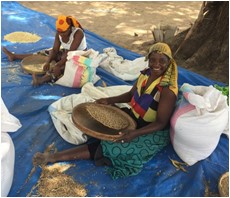Speeches Shim
Overview
Agriculture is the backbone of Mozambique’s economy. More than 80% of Mozambicans are employed in the agricultural sector with 90% of those being women. Therefore, accelerating agricultural growth is a key means of eradicating poverty and increasing food security in rural areas where poverty is widespread. The crops targeted by this activity (common bean, cowpea, groundnuts, pigeon pea and soybean) are the foundation of Mozambique’s food and nutrition security and a source of income for many smallholder farmers. Nevertheless, the competitiveness and profitability of most smallholder legume and sesame farmers are constrained by low productivity due to limited access to improved varieties and outdated agronomic practices.
Program Description
SEMEAR is a five-year activity that builds upon previous USAID support to applied agricultural research, technology transfer and related capacity building. Previous support resulted in the release of more than 27 varieties of key Feed the Future pulses and oilseeds. SEMEAR will increase the production, supply and adoption of breeder, pre-basic, basic and certified seeds of targeted crops. These seeds are drought tolerant, resistant to endemic pests and diseases, have end-user preferred traits, and show significant increases in yields on farmers’ fields. Through win-win partnerships with the private sector, SEMEAR will strengthen the national seed system, scale up and enhance the adoption of best crop management practices and enhance the national policy dialogue on seed and fertilizer supply.
Expected Results
- 100,000 smallholder households benefited and 110,000 hectares (ha) under improved technologies and management practices.
- Sales over $15 million will be reached by year five of the project and 10,000 tons of certified seeds will have been made available to farmers.
- The first year (2016) results of the project are encouraging with 21,325 ha under improved technologies, 16,163 households assisted, and a total of 548 tons of seeds produced.


Comment
Make a general inquiry or suggest an improvement.